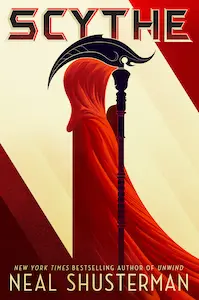Scythe - Summary
Neal Shusterman

Introduction
In Neal Shusterman’s captivating novel, “Scythe,” the author delves into a dystopian world where death has been conquered, and the responsibility of population control falls upon a group of individuals known as Scythes. Set in a future where immortality is a reality, Shusterman explores the ethical implications of a society where death is no longer natural, and the power to end lives lies in the hands of a select few. This book summary will provide an overview of the key themes, plot, and characters in “Scythe,” showcasing the author’s ability to create a thought-provoking narrative that challenges our perceptions of mortality and power.
The World of Immortality
In “Scythe,” Shusterman introduces readers to a world where humanity has achieved immortality through advanced technology. The Thunderhead, an all-knowing artificial intelligence, governs society and ensures its smooth functioning. However, with no natural deaths occurring, the population continues to grow exponentially, leading to the necessity of Scythes. These individuals are tasked with “gleaning” or permanently ending lives to maintain population control.
The Role of Scythes
Within this world, Scythes are granted immense power and responsibility. They are expected to be impartial, unbiased, and follow a strict set of rules and guidelines. Citra and Rowan, the two main protagonists, are chosen as apprentices by Scythe Faraday, who seeks to instill in them a sense of morality and compassion. Through their training, we witness the internal struggles faced by these young apprentices as they grapple with the weight of their newfound roles.
The Journey of Citra and Rowan
As Citra and Rowan embark on their training, they encounter various challenges and dilemmas that test their beliefs and values. Shusterman skillfully weaves their individual stories, showcasing their growth and development throughout the novel. Citra, initially hesitant about her role as a Scythe, gradually begins to understand the importance of compassion and empathy in the face of death. Rowan, on the other hand, struggles with his darker impulses, questioning the morality of his actions.
The Dark Side of Immortality
While immortality may seem like an ideal state, Shusterman explores the dark underbelly of this concept. The absence of death has led to a society where life has lost its value, and the fear of mortality no longer exists. This lack of fear and consequence has given rise to a group of Scythes known as the New Order, who relish in the power they possess and use it for their own gain. Shusterman effectively portrays the dangers of unchecked authority and the corruption that can arise when individuals are given absolute power.
Ethical Dilemmas and Moral Complexity
One of the most compelling aspects of “Scythe” is the exploration of ethical dilemmas and moral complexity. Shusterman presents readers with thought-provoking scenarios, forcing them to question their own beliefs and values. Should one life be valued over another? Is it morally justifiable to end a life for the greater good? These questions are at the heart of the novel, challenging readers to consider the implications of a world without death.
The Power of Redemption
Throughout the narrative, Shusterman emphasizes the power of redemption and the potential for change. As Citra and Rowan navigate their roles as Scythes, they are confronted with the opportunity to challenge the status quo and bring about meaningful change. Their journey showcases the importance of compassion, empathy, and the ability to question authority, even in the face of seemingly insurmountable odds.
Themes of Identity and Purpose
“Scythe” also delves into themes of identity and purpose. Citra and Rowan, initially thrust into their roles as apprentices, struggle to reconcile their own identities with the expectations placed upon them. As they navigate the complexities of their training, they grapple with questions of who they are and what their purpose in this world truly is. Shusterman skillfully explores the internal struggles faced by the characters, making them relatable and compelling to readers.
The Intricacies of World-Building
Shusterman’s world-building in “Scythe” is intricate and immersive, drawing readers into a future that feels both familiar and unsettling. The author paints a vivid picture of a society where death has been conquered, exploring the consequences and intricacies of such a reality. From the Thunderhead’s omnipresence to the Scythes’ unique rituals, every detail is meticulously crafted, adding depth and richness to the narrative.
Engaging and Thought-Provoking Narrative
Shusterman’s writing style is engaging and thought-provoking, making “Scythe” a compelling read. The author seamlessly blends action, suspense, and philosophical musings, keeping readers captivated from start to finish. The pacing is well-balanced, allowing for moments of introspection amidst the fast-paced plot. Shusterman’s ability to create a narrative that is both informative and engaging is a testament to his skill as a storyteller.
Conclusion
In “Scythe,” Neal Shusterman presents readers with a thought-provoking exploration of a world without death. Through the journeys of Citra and Rowan, the author raises profound questions about mortality, power, and the complexities of human nature. Shusterman’s skillful world-building and engaging narrative make “Scythe” a must-read for fans of dystopian fiction and anyone interested in contemplating the ethical implications of a society without death.